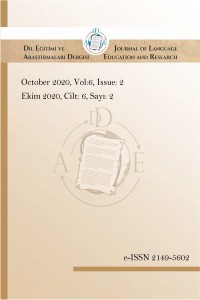Öz
Bu araştırmanın amacı Sözbilimsel Yapı Kuramının metinlerdeki önemli bilgileri belirlemede ve özetlemede nasıl kullanılabileceğine ilişkin bir görünüm sunmaktır. Araştırmaya 204 lisans öğrencisi ve 2 alan uzmanı katılmıştır. Araştırmada veri toplamak için bir bilgi verici metin Sözbilimsel Yapı Kuramına göre birimlerine ayrılmıştır. Lisans öğrencilerinden bu birimleri önem düzeylerine göre puanlamaları, alan uzmanlarından ise birimlerin görevlerini belirlemeleri istenmiştir. Elde edilen veriler üzerinde Krippendorff's Alpha, Kappa, Pearson korelasyon analizi ve betimsel istatistikler yapılmıştır. Araştırma sonuçlarına göre uzmanlar metindeki birimleri belirlemede orta düzeyde uyum içindedir. Öğrenciler Sözbilimsel Yapı Kuramının ortaya koyduğu çekirdek ve eklenti ayrımının sezgisel olarak farkındadır. Araştırmanın sonucuna göre Sözbilimsel Yapı Kuramının bilgi verici metinlerdeki önemli bilgileri belirleme ve özetlemede sunduğu katkılar sınırlıdır. Diğer kuramların da işe koşulmasıyla bilgi verici metinlerdeki önemli bilgileri belirlemede ve metinler özetlemede daha iyi sonuçlar elde edilebileceği öngörülmektedir.
Anahtar Kelimeler
Kaynakça
- Aytaş, G. (2005). Okuma eğitimi. Türk Eğitim Bilimleri Dergisi, 3(4), 461–470.
- Best, J. W., & Kahn, J. V. (2006). Research in education. Pearson.
- Brown, K., & Miller, J. (2013). The Cambridge dictionary of linguistics. Cambridge University Press.
- Chiarcos, C., ve Krasavina, O. (2008). Rhetorical distance revisited –A parameterized approach. içinde A. Benz & P. Kühnlein (Ed.), Constraints in Discourse. John Benjamins Publishing Company.
- Christensen, F. (1963). Notes toward a new rhetoric. College English, 25(1), 7–18.
- Çıkrıkçı, S. S. (2004). İlköğretim öğrencilerinde özetleme becerisinin gelişimi. Doktora tezi, Ankara Üniversitesi Sosyal Bilimler Enstitüsü, Ankara.
- Cohen, J. (1960). A coefficient of agreement for nominal scales. Educational and Psychological Measurement, 20(1), 37–46.
- Doğan, Y., & Özçakmak, H. (2014). Türkçe öğretmeni adaylarının dinlediğini özetleme becerilerinin değerlendirilmesi. Mustafa Kemal Üniversitesi Sosyal Bilimler Enstitüsü Dergisi, 11, 153–176.
- Dündar, P. (2019). Su yeryüzünü şekillendirir. Bilim Çocuk E-Dergi, 258, 40–42.
- Hare, V. C. ve Borchardt, K. M. (1984). Direct instruction of summarization skills. Reading Research Quarterly, 62–78.
- Jasinskaja, K., & Karagjosova, E. (2015). Rhetorical relations. Tarihinde 22 Nisan 2019, adresinden erişildi https://dslc.phil-fak.uni-koeln.de/sites/dslc/katja_files/Jasinskaja_Karagjosova_RR.pdf
- Kaplan, R. (1972). The anatomy of rhetoric: prolegomena to a functional theory of rhetoric. Philadelphia, The Center for Curriculum Development.
- Karadağ, Ö. (2019). Türkçe ders kitaplarında yer alan özetleme etkinlikleri üzerine bir değerlendirme. Ana Dili Eğitimi Dergisi, 7(2), 469–485.
- Kaynak, H. (2019). Hiç durmadan öğreniyorum. Bilim Çocuk E-Dergi, (139), 12–14.
- Kintsch, W. ve van Dijk, T. A. (1978). Toward a model of text comprehension and production. Psychological Review, 85(5), 363–394.
- Krippendorff, K. H. (2004). Content analysis: an introduction to its methodology. SAGE Publications.
- Landis, J. R. ve Koch, G. G. (1977). The measurement of observer agreement for categorical data. Biometrics, 33(1), 159–174.
- Mann, W. C., Matthiessen, C. M. I. M., & Thompson, S. A. (1989). Rhetorical structure theory and text analysis.
- Mann, W. C. ve Thompson, S. A. (1987a). Rhetorical structure theory: A theory of text organization. İçinde G. Kempen (Ed.), Natural Language Generation: New Results in Artificial Intelligence, Psychology and Linguistics (ss. 85–95). University of Southern California, Information Sciences Institute.
- Mann, W. C. ve Thompson, S. A. (1987b). Rhetorical structure theory: description and construction of text structures. İçinde G. Kempen (Ed.), Natural Language Generation: New Results in Artificial Intelligence, Psychology and Linguistics (ss. 85–95). Dordrecht: Springer Netherlands.
- Marcu, D. (2000). The theory and practice of discourse parsing and summarization. MIT press.
- Meyer, B. J. F. (1987). Following the author’s top-level structure: an important skill for reading comprehension. İçinde J. N. Mitchell, R. J. Tierney, & P. Anders (Ed.), Understanding Readers’ Understanding. Cambridge: MA: MIT Press.
- Meyer, B. J. F., Brandt, D. M. ve Bluth, G. J. (1980). Use of top-level structure in text: key for reading comprehension of ninth-grade students. Reading Research Quarterly, 72–103.
- Meyer, B. J. F. ve Poon, L. W. (2001). Effects of structure strategy training and signaling on recall of text. Journal of Educational Psychology, 93(41), 141–159.
- Meyer, B. J. F. ve Rice, G. E. (2002). The structure of text. içinde D. P. Pearson, R. Barr, M. L. Kamil, & P. Mosenthal (Ed.), Handbook of reading research (ss. 319–351). Lawrence Erlbaum Associates, Inc.
- O’Donnell, M. (2003). RSTTool. Tarihinde 20 Mayıs 2018, adresinden erişildi http://www.wagsoft.com/RSTTool/
- Ono, K., Sumita, K., & Seijii, M. (1994). Abstract generation based on rhetorical structure extraction. Içinde Proceedings of the 15th conference on Computational linguistics-Volume 1 (ss. 344–348). Association for Computational Linguistics.
- Pitkin, W. L. (1969). Discourse blocs. College Composition and Communication, 20(2), 138–148.
- RST Relation Definitions. (2019). Tarihinde 01 Ocak 2019, adresinden erişildi https://www.sfu.ca/rst/01intro/definitions.html
- Seidlhofer, B. (1991). Discourse analysis for summarisation. University of London.
- Stede, M., Taboada, M., & Das, D. (2017). Annotation Guidelines for Rhetorical Structure.
- Tomlin, R. S. (1985). Foreground-background information and the syntax of subordination. Text - Interdisciplinary Journal for the Study of Discourse, 5, 85–122.
- Uzêda, V. R., Pardo, T. A. S., & Nunes, M. das G. V. (2010). A Comprehensive Comparative Evaluation of RST-Based Summarization Methods. CM Transactions on Speech and Language Processing, 6(4), 1–20.
- Ülper, H. (2010). Okuma ve anlamlandırma becerilerinin kazandırılması. Ankara: Nobel Yayın Dağıtım.
- van Dijk, T. (1986). News schemata. içinde C. R. Cooper & S. Greenbaum (Ed.), Studying Writing. Linguistic Approaches (ss. 155–186). Beverly Hills: CA: Sage.
- van Dijk, T. A. (1980). Macrostructures: an interdisciplinary study of global structures in discourse, interaction, and cognition. Hillsdale, New Jersey: Lawrence Erlbaum Associates, Inc., Publishers.
- van Dijk, T. A., ve Kintsch, W. (1983). Strategies of discourse comprehension. Academic Press New York.
Ayrıntılar
| Birincil Dil | Türkçe |
|---|---|
| Bölüm | Araştırma Makaleleri |
| Yazarlar | |
| Yayımlanma Tarihi | 25 Ekim 2020 |
| Gönderilme Tarihi | 16 Temmuz 2020 |
| Yayımlandığı Sayı | Yıl 2020 Cilt: 6 Sayı: 2 |
________________________________________________
Journal of Language Education and Research (JLERE)
Dil Eğitimi ve Araştırmaları Dergisi
https://dergipark.org.tr/en/pub/jlere
ISSN: 2149-5602
Facebook Grup
Copyright © Journal of Language Education and Research


